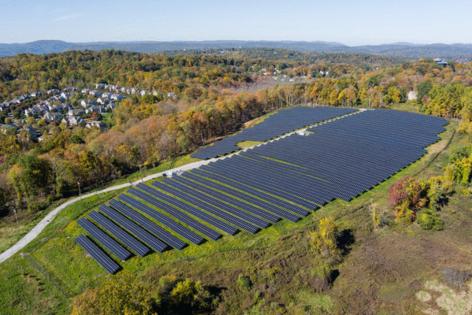Can't install your own solar panels? Some areas let you join a community project
Published in News & Features
For four generations, Steve Wine’s family has tended a 600-acre farm in Virginia’s Shenandoah Valley, raising steers and growing corn, soybeans and alfalfa. The farm has struggled in recent years with rising costs and slumping crop markets, leaving Wine to question the operation’s viability.
In a bid to sustain the farm, Wine will begin in the coming months to harvest a new crop: solar energy. He’s leased 34 acres to a solar electricity developer, which has installed panels that will generate about 5 megawatts of power at peak capacity. The project is funded by subscriptions from about 1,000 households in the region, who will receive credits on their electricity bills based on the power it generates.
“This is a fixed income that we know is going to be there,” Wine said. “I love farming, and this was an option we had to help lighten the burden.”
The energy model, known as community solar, is growing across the country. It allows people who rent homes or who can’t install rooftop panels on their own properties to subscribe to mid-size solar projects on nearby farms, schools or big-box stores.
While subscription methods can vary, industry groups say a typical monthly subscription of $120 to $135 can end up saving participants $15 to $30 a month. For many, the savings can amount to 5% to 20% of their electricity bill.
For property owners who host the solar panels, leases can be worth about $30,000 a year, according to one developer.
Backers say community solar can play an important role in expanding clean energy, and give low-income households relief on their energy costs. Although definitions can vary, the industry trade group Coalition for Community Solar Access says 20 states have policies that enable “true” community solar, which requires utilities to credit the electricity bills of households that subscribe to solar projects that aren’t built or run by the utilities themselves.
This year, lawmakers in at least 10 states have put forward bills that would enable or expand community solar programs, driven in part by federal funding opportunities from the Inflation Reduction Act. Citing consumer choice and affordability, a growing number of Republican lawmakers have sponsored such proposals, including in seven of those states.
But some bills have stalled amid strong opposition from utilities, which have argued that community solar programs don’t account for costs such as billing overhead and distribution fees, which are passed on to non-subscribing ratepayers.
“All the other utility customers can’t subsidize the benefits of those who are subscribing to community solar projects,” said Zach Hill, lead public and community affairs manager at Alliant Energy, a Midwestern utility that has opposed legislation in Wisconsin. “There’s no consumer protections [in the bill].”
...continued
©2024 States Newsroom. Visit at stateline.org. Distributed by Tribune Content Agency, LLC.







Comments